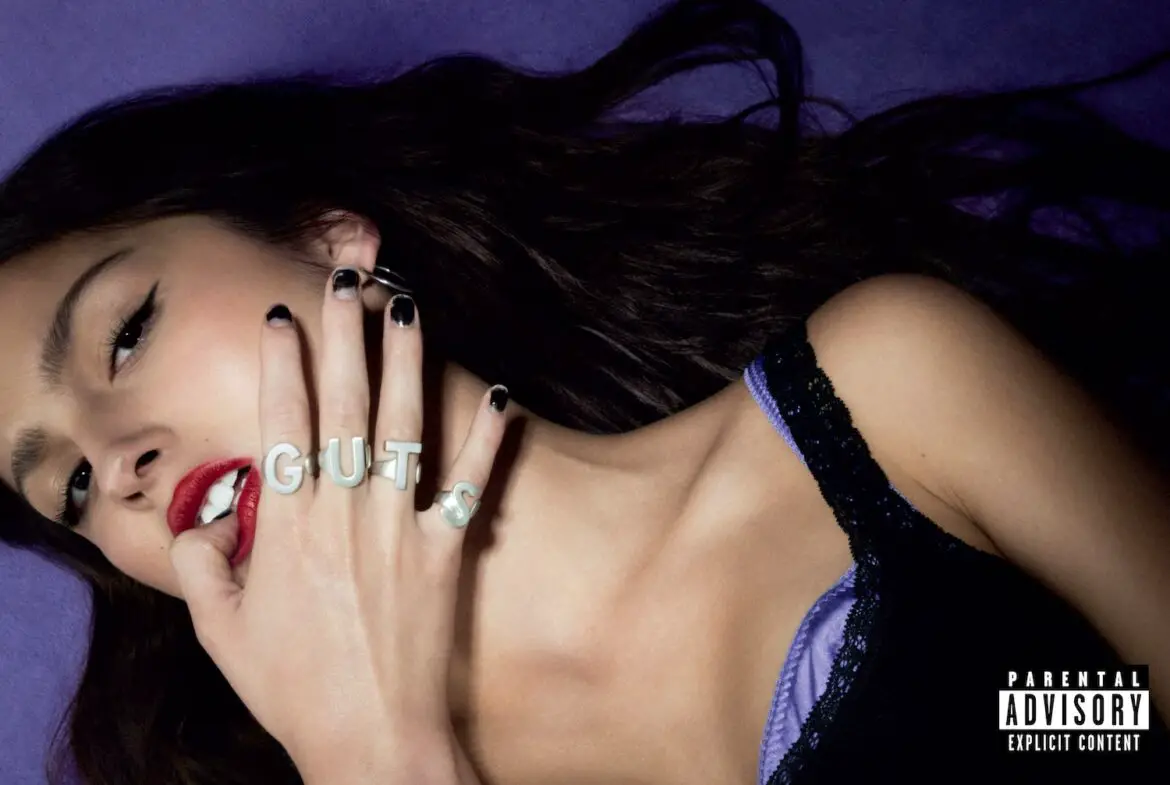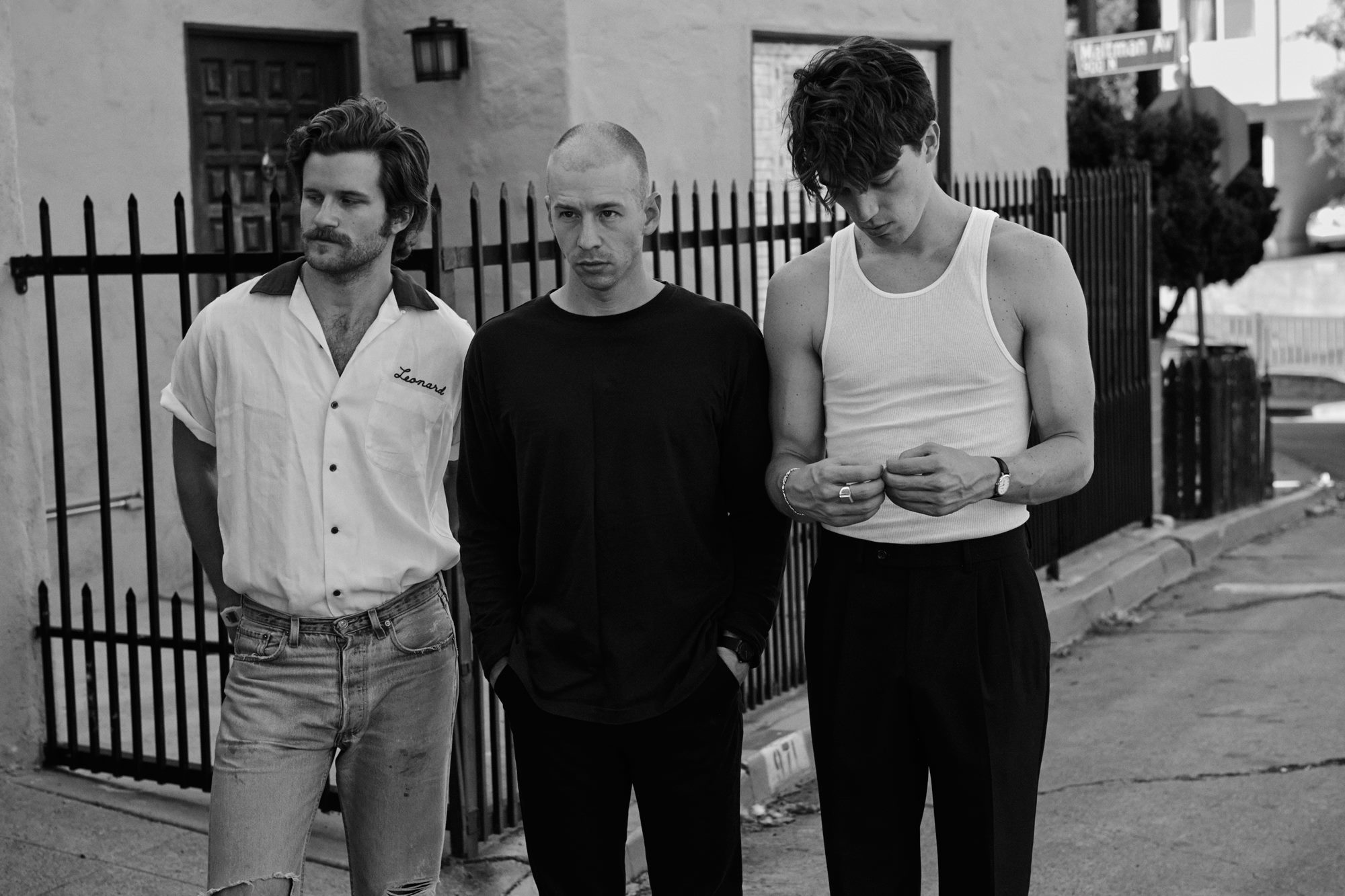‘GUTS’ is fueled with teenage angst as Olivia Rodrigo reflects on growing up, reaching adulthood, and dealing with fame.
Stream: ‘GUTS’ – Olivia Rodrigo
January 2021 not only marked the beginning of a new year, but it also marked the arrival of a new pop superstar.
With the release of “driver’s license,” Olivia Rodrigo went from Disney star to international pop sensation. When her debut album, SOUR, was released that May, her star only rose higher, collecting numerous awards (including three Grammys) and praise on the way. In the two years since Rodrigo broke out, the anticipation for her next release has been mounting.

SOUR follows Rodrigo as she chronicles her first major heartbreak. Listeners are able to relive the turmoil and emotions alongside her as songs bounce between emotions of sadness (like “driver’s license”), resentfulness (“good 4 u”), and wistfulness (“enough”). A sense of youthful naivety lingers throughout the record, emphasized by how devastating the betrayal cuts as her ex quickly moves on from their relationship. The youthfulness of the record is one of the driving forces behind its global success. Your first heartbreak is such a universal experience – one everyone has or will go through at some point – that the songs on the record stay evergreen because of it.
Much has changed for Olivia Rodrigo since the release of SOUR. Now aged 20 (19 while writing and recording her new album), Rodrigo has spent the last years of her teenage youth in the limelight. The experience of dealing with fame while growing up shaped most of her sophomore record GUTS, with a little more heartbreak sprinkled in. Released in September via Geffen Records, GUTS invokes a similar sense of teenage nostalgia as SOUR while also maintaining a distinct sense of individuality.

Heartbreak was the core of SOUR – the force that propelled Rodrigo to write those songs and what connected so many to its message. In GUTS, heartbreak becomes a side character; still there to make a couple of appearances (like every fan favorite does in the sequel), but she doesn’t give it the same importance. Now, coping with fame and coming of age have come to the forefront. The themes of love and heartbreak, societal pressure, beauty standards, and fame explored on both albums are similar, but what has changed are the methods Rodrigo uses to explore them.
GUTS is by no means a hard pivot from her earlier work, but rather it is a more mature culmination of it.
Olivia Rodrigo has never been one to shy away from her influences, her exploration in pop-punk and pop-rock started in SOUR, with tracks like “brutal” and “good 4 u.” From the start of GUTS’ album opener “all-american bitch,” a different rock influence is introduced. Still drawing from ’90s and ’00s pop-rock, the more personal and deeper exploration into her identity and womanhood on “all-american bitch” is similar in tone and style to riot grrrl acts like Bikini Kill, Breeders, and Hole. The lyrics, instrumentation, and her voice all fluctuate between sweet and angry throughout the song, going from sweetly singing in a high falsetto “I’m alright with the movies / that make jokes ‘bout senseless cruelty” to later on shouting, “I don’t get angry when I’m pissed / I’m the eternal optimist” over electric guitars.
The loud-quiet-loud formula used in the track is also inspired by pop-rock and riot grrrl acts. The riot grrrl influence is heard in more than just the instrumentation of the song; it was also a thematic inspiration. Throughout the song, Rodrigo compares herself to others and uses several different generational descriptors to paint herself as a virtuous, perfect woman. Riot grrrl music was famous for its exploration of femininity and self-discovery. Through comparisons like “I am built like a mother and a total machine,” Rodrigo is able to point out the double standards society places on women while also expressing her insecurities about where she fits within these standards. Rodrigo is able to shift the focus away from heartbreak and her exes by putting herself under the microscope for all to scrutinize, effectively making herself the center of attention on this album.
Olivia Rodrigo is able to use rock music to tap into different emotions than the ones that are typically voiced in pop music.
She has continued her experimentation into the rock and punk genres in GUTS, delving even deeper within rock music. Now traces of riot grrrl, pop-rock, pop-punk, and even rap-rock are heard on tracks like “get him back!,” “ballad of a homeschooled girl,” and “bad idea right?” While the genre of music switches, Rodrigo does not waver from her confessional, diaristic lyricism. When combined with the heavy instrumentation of rock and punk, a different effect is created. The heaviness of the music makes her message much airier, especially when compared to the melancholic nature of her ballads.
“bad idea right?” and “get him back!” both detail how Rodrigo wants to get back together with her ex, all the while knowing how much of a “bad idea” it would be. In both songs she mentions her friends not approving of her relationship as a way of alluding to its toxic nature. Olivia also goes out of her way to paint herself as a ‘crazy ex-girlfriend’ who feels hot and cold about her exes. In “get him back!,” the title itself is a double entendre: meaning that she both wants to get back together with him, and that she wants to make him hurt the same way she did. The candid self-deprecation she uses draws the spotlight to herself, allowing listeners to inspect her nature through her descriptions of her relationships.

Similarly to how the heaviness of the instrumentation in the rock songs made their tone much lighter, the opposite is true with the ballads on the record. The stripped-back nature of the instrumentation – often consisting of acoustic guitar or piano – really highlights the melancholic tone of the lyrics. The confessionality of the lyrics draws attention to the narrative shift of the album.
Even on tracks like “vampire,” where her ex is the title character, Rodrigo still spends most of the song acknowledging her role in the relationship. She doesn’t portray herself as a helpless victim, but rather as a naive girl who is learning from her mistakes. “logical” has a similar message as “vampire,” but this time she is even more focused on herself and how she contributed to the negative pattern of the relationship. Throughout the track, she retraces the progression of a previous relationship, replaying all the ways her ex manipulated her. In the outro, she sings, “I know I’m half responsible / And that makes me feel horrible,” and later, “I know I could’ve stopped it all / God why didn’t I stop it all?” to acknowledge the role she played in their relationship and realizing she had more power than her ex led her to believe.

“making the bed” is another ballad where Rodrigo takes responsibility for her actions. The title refers to the expression “you’ve made your bed, now lie in it,” meaning you must accept the consequences of your actions. Throughout the track, Rodrigo explores her imposter syndrome and the feeling that fame isn’t what she thought it would be. At the same time, she realizes that only she is to blame for how things are because she is the one who chose to pursue fame and everything else is a consequence of that decision.
Ultimately GUTS is about the feeling of reaching adulthood while learning to live under the spotlight.
Olivia Rodrigo is in a constant state of anxious fear over not being able to live up to the expectations everyone has set for her. Trying to follow up and outdo the widespread critical acclaim of SOUR, while outgrowing the “young prodigy” label that came from being so successful so early on in her career, Rodrigo expresses that she longs to be the perfect version of herself.
“teenage dream,” in particular, dives into this issue, asking in the first verse “When am I gonna stop being great for my age and just start being good?” Rodrigo expresses her insecurities of feeling too young while being simultaneously fearful of aging out of her youth. In the chorus she sings, “But I fear that they already got all the best parts of me, and I’m sorry that I couldn’t always be your teenage dream,” to show the duality of her fears.

Youth is wasted on the young, as the saying goes. We’re all so caught up in ourselves and our problems that we tend to lose sight of the bigger picture that is the rest of our lives. Our teenage years are so insignificant when compared to everything else, but our emotions are so heightened as we live through it that we tend to get wrapped up in that time period.
“It gets better, but what if I don’t?” closes out GUTS. The question hangs in the silence like a thought ever present in the back of your mind, reminding all of us that these questions can’t be answered immediately. Only growth and time will provide the answers.
— —
:: stream/purchase GUTS here ::
:: connect with Olivia Rodrigo here ::
— — — —

Connect to Olivia Rodrigo on
Facebook, Twitter, TikTok, Instagram
Discover new music on Atwood Magazine
© courtesy of the artist
:: Stream Olivia Rodrigo ::


 © courtesy of the artist
© courtesy of the artist






